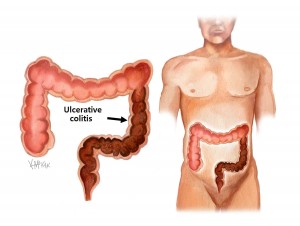.
Ulcerative colitis is a form of inflammatory bowel disease (IBD) that results in inflammation of the rectum and colon. It is not common, occurring in 5 per 100,000 of the Australian population. It most commonly has its onset in early adulthood (second and fourth decade), but can occur at any age.
Cause
The exact cause of ulcerative colitis is not known; however, many theories exist. It does not appear to be due to an infectious agent, and there is no direct single genetic mutation that is responsible. However, clusters of ulcerative colitis do exist within families, suggesting that genetics is perhaps one of many factors involved.
Site of involvement
In ulcerative colitis, the rectum is always involved causing proctitis. This involvement may extend further than this to involve the last bit of colon, or even the entire colon (pancolitis). Ulcerative colitis always causes confluent disease, meaning that there are not patches of health colon between patches unhealthy colon as is seen in Crohn’s disease. Ulcerative colitis only involves the large bowel, and cannot involve the upper gastrointestinal tract (UGIT).

Presentation
Inflammation of the inner lining of the bowel (mucosa) results in inflammation and shallow ulceration which causes diarrhoea often quite bloody, with associated mucous (dysentery). If this is longstanding, loss of blood and protein can result in anaemia and weight loss, as well as generalised fatigue.
Extra-intestinal manifestations of ulcerative colitis
Ulcerative colitis usually only affects the colon, but occasionally, it can affect the liver causing jaundice (sclerosing cholangitis), or affect the eyes causing inflammation (iritis), or cause arthritis and skin rashes (erythema nodosum) or ulcers that fail to heal (pyoderma gangrenosum). Patients with ulcerative colitis have 5.6 times the chance of colorectal cancer than the normal population. Those with extensive inflammation of their entire colon (pancolitis) are at the greatest risk of developing colorectal cancer.
Symptoms
Bloody diarrhoea with mucus is the main feature of ulcerative colitis. There may be weight loss, or abdominal pains in severe cases. The typical course of ulcerative colitis is for the condition to “wax and wane” with exacerbations often followed by periods of remission.
How is ulcerative colitis diagnosed?
Diagnosis is based on colonoscopy, with full inspection of the colon and rectum. Colonoscopy also allows for biopsies to be taken of the colon and rectum, which are then reviewed under a microscope to determine the diagnosis. In the early stages of the disease, making a definite diagnosis of ulcerative colitis is sometimes difference, and the term “indeterminate colitis” is used. There is no single blood test to diagnose ulcerative colitis, however a number of blood tests including White Cell Count and inflammatory markers often support the diagnosis of an acute attack of ulcerative colitis
Medical treatment of ulcerative colitis
Medications for treating ulcerative colitis include those used for well controlled disease to maintain the disease of which salazopyrine and mesalazine are most commonly used. Sometimes a slightly stronger drug azathioprine (Imuran®) is needed. For acute attacks or “flare-ups” anti-inflammatory drugs such as hydrocortisone and prednisone are necessary. These can be applied directly to the rectum in the form of enemas (Predsol®) or as foams (Salofalk®), or taken systemically, either intravenously (hydrocortisone) or orally as a table (prednisone).
Cure for ulcerative colitis
Unfortunately, there is no known cure for ulcerative colitis other than surgical removal of the large bowel. Colonoscopy, to view the rectum and large bowel and to allow biopsies to be taken to check for pre-cancerous or cancerous changes, are important and should be done every 3-5 years.
Surgery for ulcerative colitis
Surgery is indicated when medical treatment has failed, and can no longer control the symptoms that prevent a normal lifestyle. Surgery is also indicated if the side-effects of long-term medications are creating complications. Surgery is sometimes needed if there is cancer or risk of cancer. Emergency surgery to remove the colon is occasionally needed when the disease is out of control.

